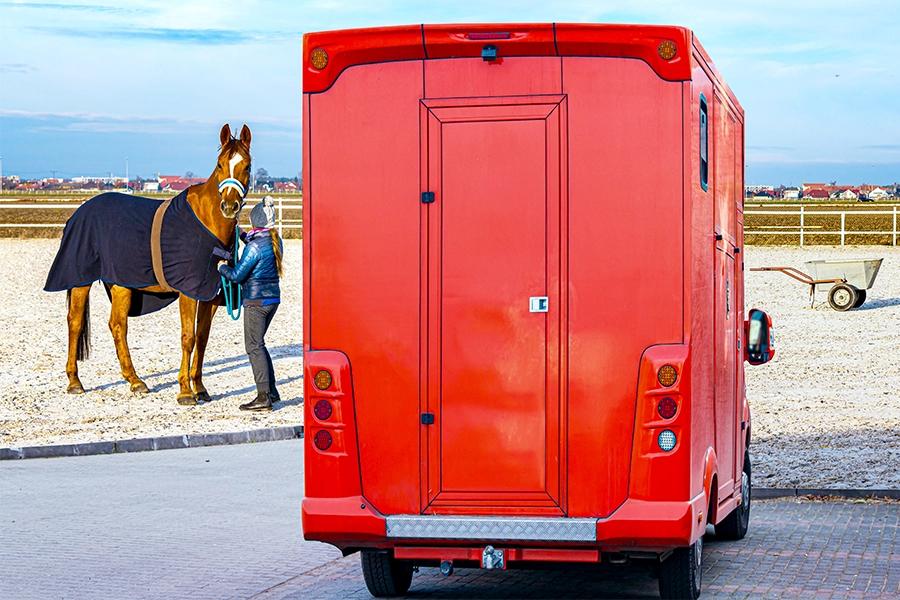Horsebox Insurance in the UK (2026): Cost, Cover and Hire & Reward
A practical UK guide to horsebox cover: typical costs, what is usually included, what can invalidate a claim, and when hire and reward rules apply.

Buying cover for a horsebox can seem straightforward until you need to claim. If the vehicle details, usage class, or driver profile are wrong, payouts can be delayed or refused. This guide explains what to check before you buy, what costs usually look like, and where owners most often come unstuck.
What horsebox insurance usually covers (and what it doesn’t)
At its core, horsebox insurance is motor cover for the vehicle itself. It allows you to use the vehicle legally on the road and provides third-party liability protection. Depending on the level of cover you choose, it may also include accidental damage, fire and theft protection for your own horsebox.
It is not the same as horse insurance. While some policies include limited horse-in-transit benefits, full veterinary fee cover, mortality protection, and broader equine health risks are usually arranged under separate equine insurance policies.
If you are still at buying stage, read our complete horsebox buying guide and horsebox payload calculation guide first.
Is horsebox insurance legally required in the UK?
Yes, for road use. If you drive on roads or in public places, you need at least third-party cover. GOV.UK sets this out in vehicle insurance guidance.
If the vehicle is off-road, status depends on whether it is declared and stored correctly. GOV.UK explains this under continuous insurance enforcement.
Typical cost of horsebox insurance in the UK
The following indicative ranges reflect common UK private and commercial quotations as of 2025–2026.
- Private 3.5t: around £300 to £900 per year.
- Private 7.5t: around £700 to £1,500 per year.
- Business / hire and reward: often £1,500 to £5,000+.
- Large commercial lorries: usually case-by-case pricing.
Higher-value 7.5t boxes with living areas are often more expensive to insure because repair values and downtime costs are higher.
Treat these as guide ranges, not quotes. Real premiums move with vehicle value, storage, mileage, postcode, driver history, and how the vehicle is used.
If you are deciding between vehicle classes, compare current 3.5t horseboxes for sale and 7.5t horseboxes for sale. Market value has a direct effect on premiums. You can also review verified horsebox and trailer trade sellers.
How to lower premiums without cutting essential cover
If you are trying to reduce cost, focus on lowering risk rather than stripping policy terms:
- Choose an excess you can genuinely afford.
- Improve storage and security (tracker, immobiliser, physical locks).
- Keep named drivers tight and accurate.
- Declare mileage honestly and review annually.
- Re-check usage class each year, especially if work becomes commercial.
- Update the insurer after material changes (value, modifications, uprating).
Done properly, this can reduce price without creating claim gaps.
Levels of horsebox cover explained
Most policies are sold as:
- Third-Party Only (TPO): legal minimum.
- Third-Party, Fire and Theft (TPFT): TPO plus fire/theft protection for your own vehicle.
- Comprehensive: usually includes accidental damage to your own vehicle as well.
For many owners, comprehensive cover is the practical default because repair bills can be substantial.
What is usually included in horsebox insurance?
Policy wording differs, but common inclusions are:
- Third-party liability.
- Accidental damage (if comprehensive).
- Fire and theft.
- Windscreen cover.
- Optional breakdown and recovery.
- Optional tack/equipment cover in transit.
- Optional European travel extensions.
Common reasons claims are challenged
Most problems come from mismatch between policy details and real-world use. Frequent issues:
- Wrong usage class.
- Undeclared modifications or uprating.
- Driver not eligible under policy terms.
- Material mileage differences.
- Security/storage terms not met.
- Overloading against plated limits.
If anything significant changes, tell your insurer before renewal or claim.
Private use vs hire and reward
Standard private social and domestic policies usually do not cover paid transport. If you move horses for payment or commercial benefit, you typically need specialist terms.
Commercial activity can also bring extra legal obligations depending on vehicle and operation. GOV.UK covers this in horsebox and trailer owner guidance.
For licence and compliance context (B, C1, C, CPC), see our horsebox driving licence requirements guide.
3.5t vs 7.5t: what insurers usually care about
The right policy depends on your setup, not just tonnage.
For 3.5t vehicles, underwriters often focus on payload reality, declared usage, and driver profile. For 7.5t and above, scrutiny typically increases around entitlement, storage, commercial indicators, and distance patterns.
If your setup changed recently, review our horsebox uprating guide and horsebox payload calculation guide before re-quoting.
Insuring a converted horsebox
Converted vehicles can absolutely be insured, but details must be declared correctly.
Insurers commonly ask for:
- Conversion type and age.
- Plated weight and uprating status.
- Material modifications (including suspension/security changes).
- Value basis (market value or agreed value).
- Actual usage pattern.
Many specialist brokers ask for payload confirmation or plated-weight documentation for higher-risk policies. If the vehicle is incorrectly classified (for example as a van), claims can be disputed.
How to compare policies properly
A clean checklist helps you avoid buying on price alone:
- Is the policy explicitly written for horsebox use?
- Does usage class match reality?
- What is included as standard versus optional?
- What excesses apply?
- Are horse-in-transit and tack limits clear?
- Does breakdown support horse-on-board scenarios?
- Are mileage, driver, and storage terms realistic?
- Are conversion/uprating details accepted in writing?
- Are territorial limits suitable for your travel pattern?
A simple side-by-side comparison table is often enough to avoid expensive mistakes.
Insurance for towing a horse trailer
If you tow, your towing vehicle still needs valid motor insurance for road use. Separate trailer cover is often optional but can be worthwhile for theft and damage protection.
Do not assume the tow-car policy covers every trailer loss. Confirm own-trailer cover, third-party position while towing, and territorial terms.
For practical towing setup and legal basics, read our horse trailer towing guide.
Conclusion
The best policy is rarely the cheapest one. It is the one that accurately reflects how you actually use your vehicle.
If you only do three things, do these: declare use honestly, verify weights and licences, and compare wording line-by-line before buying.
Disclaimer: This article is for general informational purposes only and is not financial or legal advice. Terms vary by provider and policy wording. Always check current official guidance and seek professional advice where needed.
Frequently Asked Questions
Is horsebox insurance legally required in the UK?
How much does horsebox insurance cost in the UK?
Does this policy cover the horse while travelling?
What does hire and reward mean?
Can you insure a converted horsebox?
Do I need separate insurance for a horse trailer?
Horseboxes For Sale
Explore all horseboxes currently listed on Moving Manes, from brand new builds to well-maintained used options.
